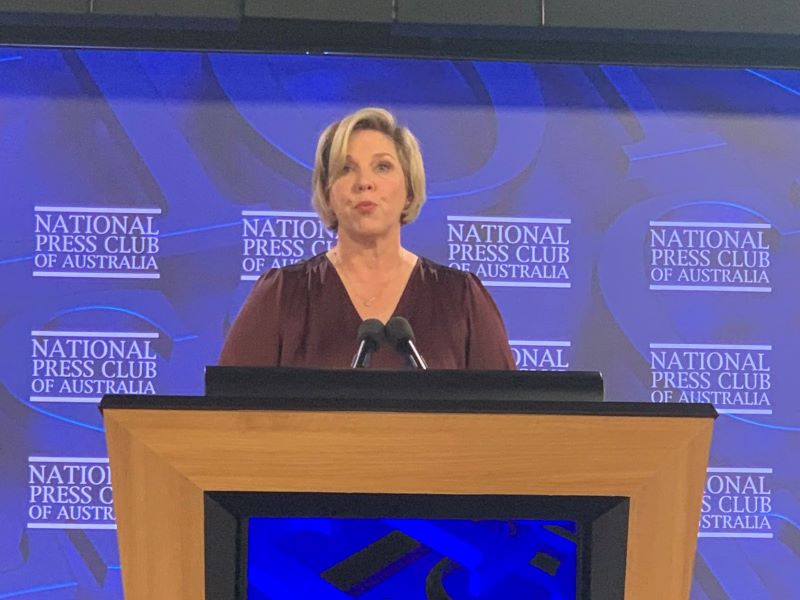Australia should be doing almost everything in the electric vehicle value chain from mining and refining critical minerals to building batteries and even manufacturing cars, Tesla chair Robyn Denholm says, declaring that no other country has more to gain from the move to zero emission vehicles.
Ms Denholm, who chairs the world’s biggest electric vehicle (EV) manufacturer Tesla, told the National Press Club on Wednesday that the cars her company makes presents “one of the greatest economic opportunities for Australia this century”.
Having previously championed the potential of batteries for the nation, Ms Denholm said Australia should aim higher still and resurrect its car making industry into a more advanced one built around EVs.

“No country has more to gain from the world moving to electric vehicles than Australia,” she said. “We can be a renewable energy superpower.”
Demand is growing for Tesla’s vehicles and more broadly for EVs, Ms Denholm said, and Australia is in a rare position of having rich deposits of exactly what’s needed to make them, like lithium, cobalt, zinc, copper, gold and rare earths.
“Australia should aim to do the refining, the battery cell manufacturing, and the vehicle manufacturing. We can and should do all of that,” she said.
“I once worked at Toyota when cars were still made in Australia, and I believe Australia can have an even bigger car industry in the electric age, where tech skills converge with manufacturing skills to create advanced manufacturing industries.”
Tesla alone already spends $1 billion annually on Australian minerals for its batteries and car components. 70 per cent of the lithium Tesla uses already comes from Australia, but it is largely refined and processed offshore, while components and vehicles are currently manufactured at Tesla factories in the US, Europe and China.
Ms Denholm said high labour costs in Australia relative to competing manufacturing nations would be less of a factor in the new wave of “advanced manufacturing” being used to produce EVs.
“Advanced manufacturing is a very different type of manufacturing,” she said. “Yes, there are people in factories, but the reality is by applying tech to the manufacturing process, you actually take some of those [cost] barriers away.”
The Tesla chair pointed to the company’s factory in Fremont, California – “one of the most expensive places on the planet” – which last year produced an average of 8,550 cars a week, shipping them all around the world.
It’s more than any other auto-manufacturer in North America, and the factory has grown rapidly since 2017 with people working alongside robots. The approach, and the access to the raw materials and potentially components, offers an opportunity for Australia.
“To me, the fact that we don’t currently have a car manufacturing industry in Australia is actually not a bad thing,” Ms Denholm said. “Because we have the skills and we can re-tool and get people into advanced manufacturing, which is tech and manufacturing converging.”
Policy levers are needed to encourage domestic EV and manufacturing and the lithium ion storage batteries used in them and across energy systems, Ms Denholm said. She called for the private sector to work with government on attracting investment but said incentives aren’t necessarily required because the exponential growth is plain to see.
What is needed, however, is urgency.
“The supply chains for the electric vehicles and the lithium ion storage batteries that are key for renewable energy are being formed now. They’re not being formed in 20 years’ time and they weren’t being formed 20 years ago. It’s now,” she said.
“So to me, that’s why I think it’s a unique opportunity.”
Ms Denholm is also the chair of technology industry lobby group the Tech Council of Australia and an operating partner at venture fund Blackbird. She said electric vehicles are only one of an emerging group of technology-related industries offering prosperity to Australia.
“Tech jobs have grown at close to double the rate of average jobs growth in the economy since 2005 and are now equivalent to Australia’s seventh biggest employing sector,” she said.
“In fact, there are more software engineers and developers in Australia today than solicitors, plumbers, or hairdressers.”
Asked about the downturn in valuations of technology stocks, Ms Denholm said “all industries go through ups and downs” but it was not time to pull back on what is working.
“Through any macro-economic downturn, what you see are the technologies that are actually taking off before the downturn happens, they actually accelerate through a downturn period of time. It happened through the GFC, it happened through the .com era, it happened in the 80s when there were different macro-economic downturns,” she said.
“So for me, investment into technologies through an economic cycle is actually a very good way of spearheading some of the technologies that we need over the next period of time.”
Do you know more? Contact James Riley via Email.


Ms Denholm doesn’t get it. What, the Department of EVs? A load of APS will get in their overalls and manufacture cars? What’s this madness “Australia can and should manufacture EVs”? It’s the same as the Australia has natural resources meme. But I don’t have any natural resources. They’re private property. Someone else owns them. This is same con-job to pull on my sense of national identity. Australia ‘can and should’ manufacture EVs?? “Australia should aim to do the refining, the battery cell manufacturing, and the vehicle manufacturing. We (how does that include me?) can and should do all of that,” Denholm said. She’ll be wearing overalls at the launch the Department of Batteries, Cars and Refining – DBCaR, another policy department – in Fyshwick.